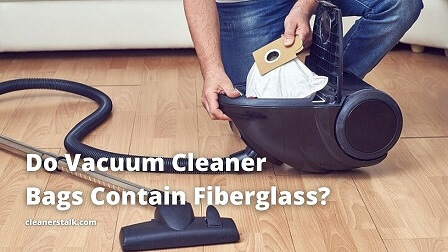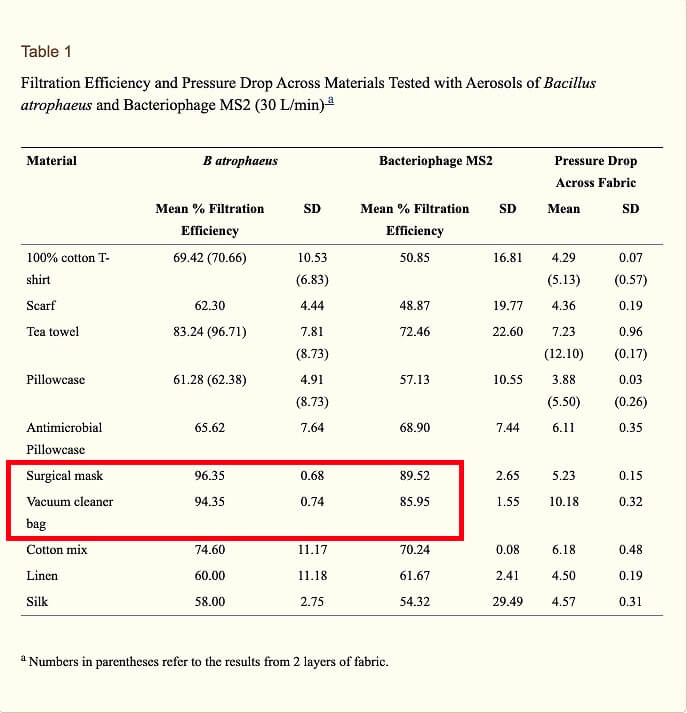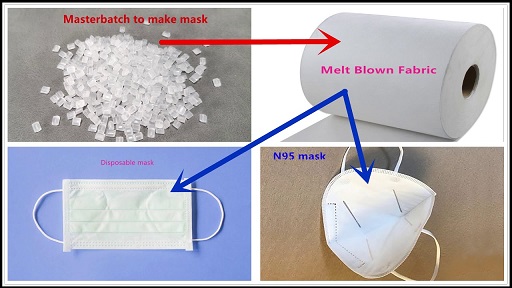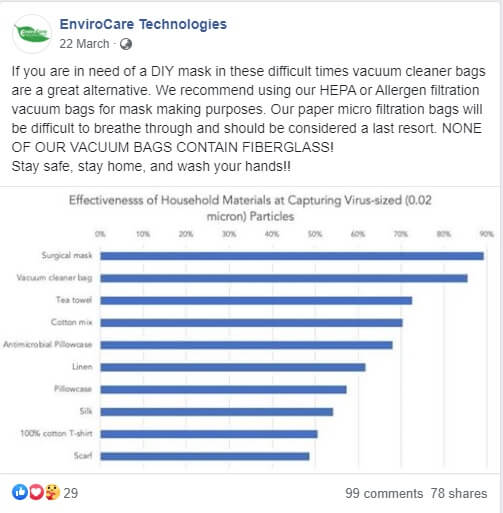
Do Vacuum Cleaner Bags Contain Fiberglass?
Cleaners Talk is reader-supported. This post contains affiliate links, we may earn a commission at no additional costs to you. As an Amazon Associate we earn from qualifying purchases.
With the decreased supply and increased demand for N95 masks, many people have resorted to alternative methods of protection. One method in particular, is using vacuum cleaner bags as face protection. Because of this, many ask the question whether or not vacuum cleaner bags contain fiberglass or not.
Do vacuum cleaner bags contain fiberglass? No, vacuum cleaner bags do not contain fiberglass. HEPA filter vacuum bags are made from melt-blown polypropylene material known for its filtration efficiency. Many vacuum bag manufacturers have also stated that their vacuum bags do not have nor contain fiberglass.
This interesting topic came up due to a viral video from a doctor in London, stating that vacuum cleaner bags are made from ‘glass microfiber’ that can damage the human respiratory system. In this post, let’s take a deep dive into answering the question: do HEPA vacuum bags have or contain fiberglass? Let’s get started.
Busting the Vacuum Bags Myth
To better understand this interesting topic at hand, we need to go back to where it all began. Due to several controversies, many wonder what vacuum bags are made of. Read on below and we’ll walk you through everything you need to know surrounding vacuum cleaner bags and their particle filtration effectiveness.
1. How It All Began
So, how did this myth come to be? In 2013, as part of a broad study on disaster preparedness, Cambridge University conducted a study on possible homemade masks as opposed to surgical masks. The results show that certain materials were not as good as surgical masks, but they were certainly better than nothing.
In the Cambridge Study, a range of common household materials were tested together with the material from surgical masks. The list of materials include scarves, cotton t-shirts, and more notably, vacuum cleaner bags. These materials were then compared with surgical masks in terms of effectiveness.
What they found was that vacuum cleaner bags were ONLY approximately 4% less effective in terms of filtration than surgical masks, compared to regular cotton t-shirts, that were around 40% less effective in terms of filtration than surgical masks. Check out the data in the picture from the study below:

According to the data above, vacuum cleaner bags have similar filtration efficiency to surgical masks.
This data started circulating the internet in the midst of the pandemic, and became very relevant. It created a massive spike in demand for HEPA vacuum cleaner bags. Thousands of volunteers made improvised protective equipment with vacuum bags to help others and keep up with the demand for facemasks.
This is where it gets interesting: Many people started to wonder if vacuum bags have fiberglass or not after several videos had gone viral from individuals outside the vacuum cleaner industry, including a doctor from London (Simon Freilich), who had stated that vacuum cleaner bags contain or have fiberglass.
One theory suggests that these individuals may have thought that the vacuum bags were made out of the same material as car filters, or some types of furnace or HVAC filters, which may contain fiberglass. However, this is false. It’s safe to say that vacuum bags do not and have not ever contained microfibers or fiberglass.
2. What Are Vacuum Cleaner Bags Made Of?
So, what are vacuum cleaner bags made of? Most HEPA vacuum cleaner bags are made of melt-blown polypropylene material, which is also known as melt-blown or melt-blown material.

HEPA vacuum cleaner bags are made from melt-blown fabric, the same material used to make surgical facemasks.
The melt-blown process is a one-step process whereby high-velocity air blows a molten thermoplastic resin from an extruder die tip onto a conveyor to form a fine, fibrous and self-bonding web. The fibers in the melt-blown web are laid together by a combination of entanglement and cohesive sticking.
According to this FDA filing and this CDC filing, melt-blown is the most efficient way to make a highly efficient media filter. The raw material used in this process is a thermo-plastic synthetic material. It’s important to note that the melt-blown process is the same process that is used to make N95 respirator masks.
HEPA stands for High Efficiency Particulate Absorbing. This simply means that it is designed to filter particles from the air. You can check out this interesting video by Joe Neill comparing the properties of fiberglass and vacuum bags. He also tested the filtration effectiveness of a Miele AirClean FJM vacuum bag:
As you can see in the video above, the face masks that are commercially available are not much better than facemasks made from HEPA filter vacuum cleaner bags. Melt-blown polypropylene materials are very comparable in terms of filtration effectiveness to that of commercial N95 face masks.
3. Do HEPA Vacuum Cleaner Bags Have Fiberglass?
Let’s answer it once and for all. HEPA vacuum cleaner bags have not ever, and do not contain fiberglass. Cloth HEPA vacuum cleaner bags are created to offer the highest level of protection and filtration available, and are made from melt-blown polypropylene material. This material has superior filtration properties.
It’s safe to say that HEPA vacuum cleaner bags do not and have not ever contained microfibers or fiberglass.
The main purpose of HEPA filtration vacuum cleaner bags is to prevent damaging particles, dust, debris, and bacteria from going back into the air. These vacuum bags have been recommended by experts to people who have lung or allergy issues, so the idea that they can damage the human respiratory system is bizarre.
EnviroCare Technologies, as one of the biggest brands in vacuum cleaner bags and filters, have posted an on-point response on their Facebook page, stating publicly that their products do not contain fiberglass. They have also stated that their HEPA or Allergen filtration vacuum bags are a great alternative for facemasks.

Other well-known brands like Hoover and Kirby have stated that none of the vacuum bags contain fiberglass. This is an official statement by Hoover:
HOOVER® replacement vacuum bags offer the highest level of particle protection for your vacuum. Shop our selection of HEPA Media vacuum bags and capture 99.97% of allergens including dust, dander, pollen, and mold while blocking them from re-entering the air while you clean.
Hoover®
Techtronic Floor Care Technology Limited
This is a testament to the filtration effectiveness offered by vacuum cleaner bags. If you are in need of a DIY mask during difficult times, vacuum cleaner bags are a great alternative. We recommend using HEPA vacuum bags for mask-making purposes. However, this should only be considered a last resort.
Final Verdict
And there you have it, a comprehensive breakdown of the answer to: do vacuum cleaner bags have or contain fiberglass? Now that we’ve busted the myth surrounding vacuum bags, you can have peace of mind knowing that it’s almost as effective as surgical masks in terms of filtration. Stay safe and stay healthy. 🙂
Related articles:
